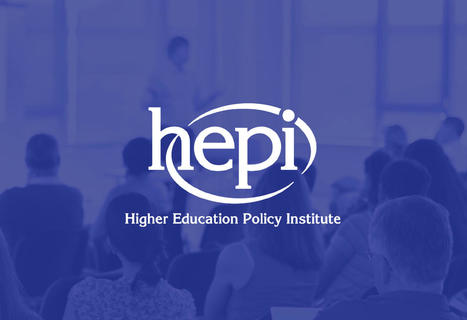 Your new post is loading...
 Your new post is loading...

|
Scooped by
heather dawson
July 7, 7:24 AM
|
Today the UPP Foundation publishes a recommendations paper that concludes its four-part inquiry int

|
Scooped by
heather dawson
July 4, 4:54 AM
|
Report outlining the first year of the Metascience Unit, with evidence and insights on how to improve the UK’s research and innovation funding system.

|
Scooped by
heather dawson
June 27, 3:27 AM
|
In recent years, financial pressures have mounted across the entirety of the UK higher education (HE) sector and left many institutions in an exceptionally vulnerable position. In England alone, 43% of institutions are expected to face a financial deficit for 2024-25, prompting the House of Commons Education Select Committee to announce an inquiry into university […]

|
Scooped by
heather dawson
June 25, 3:24 AM
|
It's easy to roll your eyes over the input of students to APPs. Marta Almeida Hill and Francesca Plom explain how to co-create widening participation strategy with those it impacts It's easy to roll your eyes over the input of students to APPs. Marta Almeida Hill and Francesca Plom explain how to co-create widening participation strategy with those it impacts

|
Scooped by
heather dawson
June 24, 3:30 AM
|
Public First is today publishing the second of two pieces commissioned by the University of York around the impact of international students – this time [...]

|
Scooped by
heather dawson
June 19, 3:12 AM
|
This YouGov survey focused on perceptions of free speech within higher education, and whether academics felt free to express challenging and controversial ideas and theories in their teaching, research, and other contexts.

|
Scooped by
heather dawson
June 18, 3:06 AM
|
EXECUTIVE SUMMARY Conducted between August and October 2024 and publicised mainly by members of the University and College Union (UCU), the ‘Survey for UCU Members on HE Redundancies’ invited responses from UCU members at universities where managers were implementing redundancy processes (broadly conceived) or had done in the past five years. The findings in this report are based on 349 survey responses, spanning 97 higher education institutions. We estimate that approximately 8,900 people are being, or recently have been, affected by compulsory redundancies across the sector’s 165 institutions. We estimate that around 11,500 people in the higher education sector are affected by ‘backdoor’ redundancies, such as hiring freezes, non-renewal of fixed-term contracts, voluntary severance and redundancy, protected conversations, and fire and rehire. Unethical practice Numerous respondents report unethical and even potentially unlawful behaviour by their employers. They allege that of the 97 institutions represented in survey responses: 73% of HEIs are failing to adequately consult with those individuals at risk of redundancy. 73% of senior management teams are failing to implement/accept suggested alternatives to redundancies. 69% of HEIs are failing to adequately consult with trade unions. 54% of senior management teams are bullying staff into applying for voluntary severance and/or voluntary redundancy. 52% of HEIs are failing to adhere to institutional policies governing redundancy processes. 45% of HEIs are failing to follow legislation governing redundancy processes. 29% of HEIs are misusing ‘protected conversations’ to make staff redundant. The human cost The impacts on staff—whether they remain in post or lose their jobs—are striking: 91% noticed a deterioration in working conditions, including less collegiality and lower morale. 90% cited emerging anxiety, stress, depression or other health problems as a result of redundancy processes. 87% said workloads for remaining staff increased when colleagues were made redundant. 76% noted worsening of existing mental health or other health problems. 36% described the undermining of academic freedom. 36% cited the targeting of people openly critical of management. 23% noticed the targeting of people with protected characteristics for redundancy. 21% alleged trade union victimisation in the selection of people targeted for redundancy. What respondents said about their experiences: ‘It felt, as a colleague said, “like watching the birth of fascism”, as colleagues singled out for redundancy were isolated.’ ‘Sickening to see university advertising for social justice. Corruption within HE is rampant. Look at who is being protected and why.’ ‘Our university has given a pompous name to the process of reshaping the work and workload of who is left which — de facto — amounts to covering holes, more workload, less freedom on how to do the work (less academic freedom) and, in the end, less services for staff and students.’ ‘An atmosphere of fear and intimidation for any who do not toe the line. I love this university but despise its hateful, greedy and mostly incompetent leadership. If I had an option to leave, I would take it now.’ ‘Where is the debate and discussion and students who come for love of the subject and passion for learning? All of this has been reduced to ‘customers’ paying ~£9k a year to be spoon-fed job training. What is the point??? Honestly, if I could get out and switch career, I would.’ The survey questions, and respondents’ open-box answers to one pertinent question, are reproduced as appendices to this report.

|
Scooped by
heather dawson
June 17, 3:14 AM
|
In partnership with the UK Council for Graduate Education — supported by funding from the Enhancing Research Culture fund at the University of York — we have produced a toolkit for higher education institutions setting out what the new Office for Students' regulatory requirements mean for postgraduate researchers (PGRs) and supervisors. Download the toolkit. Sign up for…

|
Scooped by
heather dawson
June 13, 3:43 AM
|
The Student Academic Experience Survey (SAES) 2025, published today by Advance HE and HEPI, reveals a dramatic rise in the proportion of full-time undergraduates undertaking paid work working during term time.

|
Scooped by
heather dawson
June 12, 11:25 AM
|
The Declaration on Research Assessment (DORA) recognizes the need to improve the ways in which the outputs of scholarly research are evaluated.

|
Scooped by
heather dawson
June 12, 9:07 AM
|
This scoping review aims to identify how academic libraries in the United States and Canada have supported early career academic librarians through pr…

|
Scooped by
heather dawson
June 10, 3:07 AM
|
Attract, retain and support disadvantaged students with our new report, 'The impact of socioeconomic background on the student experience.'

|
Scooped by
heather dawson
June 4, 3:26 AM
|
Carers in academia is a relatively novel but topical field. Staff with caregiving responsibilities represent a significant presence in the higher education (HE) workforce. Despite their valuable contribution to society and the economy, carers face many challenges. Some of these challenges have been heightened and rendered visible by the ongoing Covid-19 pandemic, although this newly…
|

|
Scooped by
heather dawson
July 4, 6:39 AM
|
In 2024, the British Academy and CaSE commissioned Cambridge Econometrics and the Innovation and Research Caucus to conduct this systems-based analysis of the strengths and weaknesses within the UK’s innovation system.

|
Scooped by
heather dawson
July 3, 4:16 AM
|
This is the first of two reports that investigate the digital experiences of transnational education students and staff. The second, which will summarise primary research findings from surveys and focus groups, will be published in October 2025.With one in five registered UK students in...

|
Scooped by
heather dawson
June 27, 3:20 AM
|
Graduate and postgraduate employment and earnings outcomes for those who graduated with a first degree (Bachelors), level 7 (Masters) or level 8 (PhD) qualification.This release updates previously published figures with the latest available data (2022-23 tax year). Coverage is of all graduates and postgraduates, including those who graduated with either a Masters or PhD, from all Higher Education Providers in England. The text, charts and tables below mainly refer to those who graduated from first degrees during academic year 2016-17 and present their employment and earnings outcomes during the 2022-23 tax year, five years after graduation. This publication provides breakdowns by subject area studied in higher education, graduate characteristics, and the region in which graduates lived during the relevant tax year. The final section provides a breakdown of EU and non-EU domiciled graduates working in the UK during the relevant tax year. We have reduced the amount of content presented in this release this year in order to make it easier for people to navigate and interpret. However all previously included data is still available in the ‘Data catalogue’, where you can download the complete underlying datasets or use the table tool to create your own tables. Information on which industries graduates work in is available in the LEO graduate industry dashboard. Employment and earnings outcomes at individual higher education provider level is available in the LEO graduate outcomes provider level release. Changes to these statistics- The Department for Education regularly reviews its statistical publications for quality and relevance of content and to ensure the statistics meet user needs. The Department is proposing to cease publication of the Graduate labour market statistics release and to instead, in future, develop this LEO publication to include comparative statistics for non-graduates with breakdowns by prior academic attainment and other student characteristics. To reflect this, next year the name of this release will change to Graduate and Postgraduate Labour Market Outcomes.
- From next year we will cease production of the LEO Graduate outcomes provider level data statistical release and instead simply make the provider level data available, in the form of a dashboard, within this main release.
- The downloadable Excel files that were included as ‘Additional supporting files’ in the previous releases of this series have not been included in this release, but all data is available in the ‘Data catalogue’, where you can download complete datasets or use the table tool to query the data to create your own downloadable tables.

|
Scooped by
heather dawson
June 24, 3:31 AM
|
Which research areas are the big winners in the new industrial strategy? David Kernohan takes notes.

|
Scooped by
heather dawson
June 20, 4:31 AM
|
Data Decoded: UK Higher Education, Immigration and Financial Sustainability

|
Scooped by
heather dawson
June 19, 3:11 AM
|
This document provides guidance to registered higher education providers and their constituent institutions.

|
Scooped by
heather dawson
June 18, 3:05 AM
|
Map representing the scope and breadth of quality assurance work across the UK higher education sector.

|
Scooped by
heather dawson
June 16, 3:46 PM
|
Toolkit for Disability Equity in Scholarly Communications a comprehensive resource from C4DISC. It is designed to improve disability inclusion scholarly communications for all forms of disability. This focuses on practical guidance in for managers, disabled people and peers. Each section has FAQs and links to useful resources. A resources section contains guides on accessibility and improving inclusion.

|
Scooped by
heather dawson
June 12, 11:26 AM
|
Stronger institutional leadership and tailored hybrid training needed to embed research integrity across academia London |Berlin| New York,

|
Scooped by
heather dawson
June 12, 9:09 AM
|

|
Scooped by
heather dawson
June 10, 3:10 AM
|
the Social Market Foundation has published a report on higher education and social mobility, suggesting that universities’ role stands to be further enhanced. The report, which was commissioned by the University of Warwick and the University of Southampton, calls for a ten-year strategy for social mobility and opportunity, which would include national and regional access targets, as well as for regulation in England to require the reporting of how many disadvantaged students come from a provider’s local area. The report argues that more selective institutions are “disproportionately recruiting from London” rather than their own regions

|
Scooped by
heather dawson
June 5, 3:19 AM
|
UK higher education institutions are increasingly boxed in on six sides: In this pacey and timely paper, Professors Diana Beech and André Spicer take a look at the situation and propose some different ways out suitable for the full range of higher education providers.
|
 Your new post is loading...
Your new post is loading...
 Your new post is loading...
Your new post is loading...























